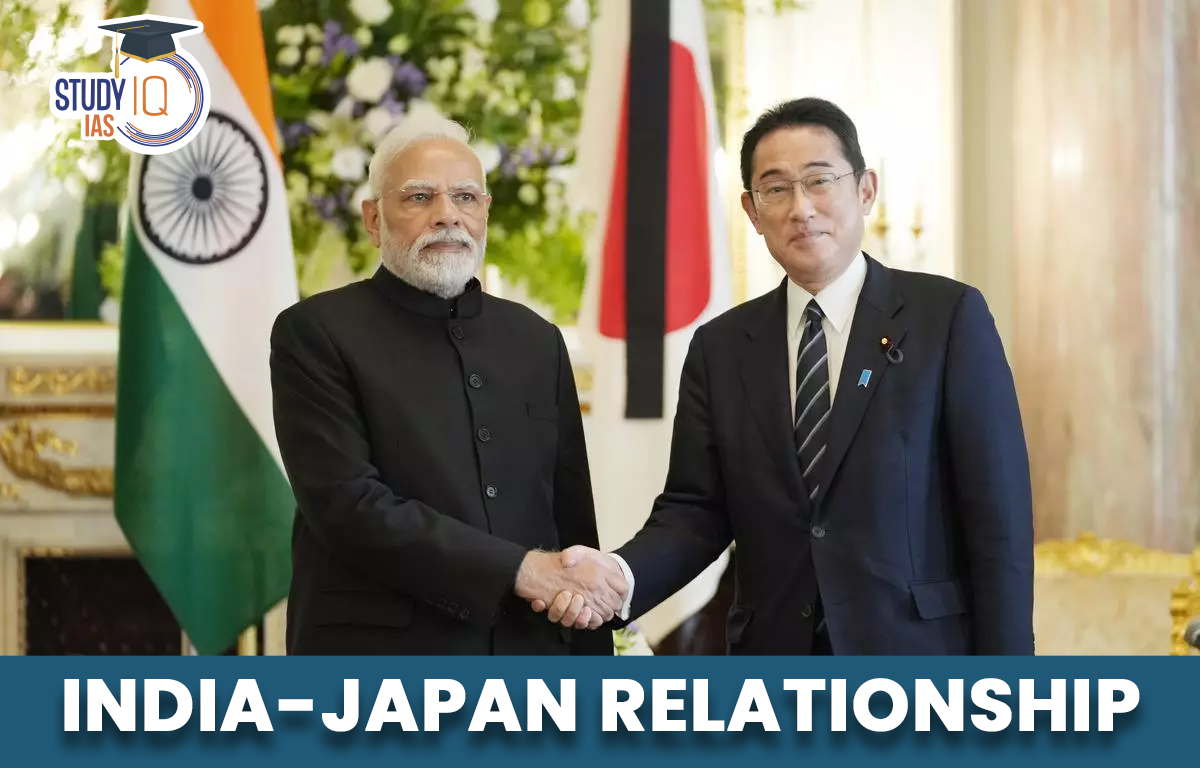Table of Contents
Context: The recent visit of the Japanese Prime Minister to India aims to strengthen the bilateral relationship between Japan and India taking into account global issues of mutual interest.
More on the News
- One of the major topics of discussion was the cooperation between the G-7 and the G-20, as Japan and India hold their presidencies, respectively.
- G 20: The G-20 is a forum of 20 major economies established in 1999 to discuss and coordinate international economic and financial policies of the nations.
- The G-20 members represent around 80% of the world’s economic output, and include both developed and emerging economies, such as the United States, China, Japan, Germany, the United Kingdom, India, Brazil, and others.
- A range of issues related to global economic governance, including trade, investment, financial stability, and sustainable development are discussed in its periodic meetings.
- G 7: The G7 is a forum of seven advanced economies consisting of Canada, France, Germany, Italy, Japan, the United Kingdom, and the United States.
- The group was established in 1975 as an informal forum for the leaders of these countries (world’s largest economies, with a combined GDP of over $40 trillion) to discuss economic issues of common concern, such as inflation, trade, and energy.
- Over the years, the G7 agenda has expanded to include a range of global issues, including climate change, security, and development.
- G 20: The G-20 is a forum of 20 major economies established in 1999 to discuss and coordinate international economic and financial policies of the nations.
- As both Japan and India hold the presidency of these respective groups, they have an opportunity to work closely together to promote cooperation among member countries and address global challenges such as climate change, economic growth, and pandemic recovery.
Japan-India Special Strategic and Global Partnership
- During the visit, the Japanese Prime Minister unveiled “Japan’s New Plan for a Free and Open Indo-Pacific” (FOIP) and discussed ways to deepen the “Japan-India Special Strategic and Global Partnership.“
- Four Pillars of Cooperation under FOIP:
- Principles for peace and rules for prosperity: Japan aims to engage in economic development programs to promote the implementation of the G-20 Principles for “Quality Infrastructure Investment” and support vulnerable countries.
- Addressing challenges in an Indo-Pacific way: Japan plans to expand cooperation for FOIP by incorporating realistic and practical projects in a wide range of areas such as climate change, food security, global health, and cyber-security.
- Multi-layered connectivity: Japan has identified three areas for introducing more connectivity projects, which include Southeast Asia, South Asia, and the South Pacific/Pacific Island countries.
- Extending efforts for security and safe use of the “sea” to the “air”: Japan will help strengthen the capabilities of maritime law enforcement agencies in other countries and implement strategic use of Official Development Assistance (ODAs) to mobilize a total of more than $75 billion in public and private funds in the Indo-Pacific region by 2030 in infrastructure development.
India-Japan Relations

Areas of Cooperation
- Economic and Commercial Cooperation:
- A Comprehensive Economic Partnership Agreement (CEPA) has been in place between India and Japan since 2011, which has contributed to an increase in bilateral trade.
- Japan has been one of the largest investors in India, with over $35 billion of foreign direct investment (FDI) in the past 20 years, primarily in sectors such as automobiles, electrical equipment, telecommunications, chemicals, and pharmaceuticals.
- Furthermore, Japan is the largest bilateral donor to India, providing Japanese Official Development Assistance (ODA) for major infrastructure projects like the Delhi-Mumbai Industrial Corridor and the Ahmedabad-Mumbai High-Speed Rail Link.
- In response to the supply chain disruptions caused by Covid-19, India and Japan are collaborating with Australia on the Supply Chains Resilience Initiative (SCRI).
- Strategic Cooperation:
- India and Japan have been collaborating with Germany and Brazil for permanent membership of the United Nations Security Council (UNSC) as part of the G4 or Group of Four.
- The 2+2 Dialogue, which includes discussions between the foreign and defence ministers of both nations, has led to an expansion of defence and strategic cooperation that extends beyond national boundaries.
- Additionally, the Quadrilateral Security Dialogue (Quad) between India, the United States, Japan, and Australia is aimed at promoting a Free and Open Indo-Pacific.
- Japan welcomes the Indo-Pacific Ocean’s Initiative (IPOI) announced in 2019 at East Asia Summit (EAS) in Bangkok for promoting safe, secure, and stable maritime domain, sustainable use of marine resources, and disaster prevention and management.
- Defence cooperation:
- Naval Exercises: JIMEX (started in 2012), Malabar (started by India and US in 1992 with Japan becoming permanent member in 2015)
- Army Exercise: Dharma Guardian (started in 2018)
- Air Force Exercise: Shinyuu Maitri (started in 2018)
- Skill Development:
- Japan and India have been collaborating to promote manufacturing in India through the establishment of Japan India Institute of Manufacturing (JIM) centres.
- These centres were set up to provide technical education and training to students in various fields of manufacturing, such as electronics, automotive, and robotics.
- As of 2021, there are 12 JIM centres in India, located in various states such as Gujarat, Rajasthan, and Tamil Nadu.
- Furthermore, Japan has pledged to train 30,000 Indian youth in Japanese-style manufacturing techniques over the next 10 years.
- This initiative is part of the Japan-India Technical Intern Training Program (TITP), which aims to provide Indian youth with practical training and work experience in Japan.
- Nuclear Energy:
- Following a temporary pause and economic sanctions on India after its nuclear tests in 1998, the country resumed its cooperation with Japan in the peaceful use of nuclear energy in 2017.
- Both nations signed an agreement that resulted in increased collaboration in energy security and clean energy, facilitated the commissioning of global nuclear reactors using Japanese components, and supported India’s bid for membership in the Nuclear Suppliers Group (NSG).
- S&T /Space Cooperation:
- In 2019, the first-ever space dialogue between India and Japan was held to explore opportunities for bilateral cooperation in space.
- Currently, the Indian Space Research Organization (ISRO) and the Japan Aerospace Exploration Agency (JAXA) are collaborating on a joint lunar polar exploration (LUPEX) mission to send a lander and rover to the Moon’s south pole by 2024.
- Additionally, the India-Japan Digital Partnership (I-JDP) was launched in 2018 to build upon the science and technology collaboration established in 1985 and focus on digital ICT technologies to foster innovation and entrepreneurship in the digital sector.
- ‘India-Japan Emerging Technology and Innovation Fund’ was established in 2019, a fund-of-funds for emerging technology startups in Internet of Things (IoT), Artificial Intelligence (AI), Machine Learning etc.
- Historical & Cultural Relations:
- Since the first Cultural Agreement in 1957, cultural relations between India and Japan have continued to flourish through friendly exchanges and increased people-to-people contact.
- The historical ties between the nations can be traced back to the 6th century when Buddhism was first introduced to Japan.
- The influence of Indian culture, transmitted through Buddhism, has had a significant impact on Japanese culture, and this has fostered a sense of affinity between the Japanese people and India.
Constraints in the Relations
India and Japan share wide range of interests including regional cooperation, maritime security, UN reforms etc. but there are some constraints in the relations-
- Bilateral trade: the trade ties have remained underdeveloped as compared to India-China trade. The share of Japan in India’s imports is merely 2.35% and India’s exports to Japan are 1.46% of total exports of India. Hence, bilateral trade is a major issue between India and Japan.
- Chinese Obsession: Some scholars criticize India and Japan relations for developing in the backdrop of rising China. They suggest co-operating on mutual grounds of Trade, Science and Technology Cooperation etc.
- Delayed and pending projects: Despite progress in economic cooperation, many projects face the issue of delay and weak economic engagements like, Asia Africa Growth Corridor, Mumbai-Ahmedabad Bullet train project etc.
- Barriers for India: India struggles to penetrate Japanese markets due to language barriers, high quality service standards etc. such issues need to be addressed to ensure increase in cooperation among both countries.
- Different interests: India’s decision to exit from the trade pillar of IPEF, exit from RCEP due to domestic compulsions are in difference with Japan’s stand for engaging proactively with India in the Indo-Pacific region.


 Accredited Social Health Activists (ASHA...
Accredited Social Health Activists (ASHA...
 World’s 1st Unique Q-Shield Platform a...
World’s 1st Unique Q-Shield Platform a...
 IB ACIO Recruitment Notification 2025 Ex...
IB ACIO Recruitment Notification 2025 Ex...





















